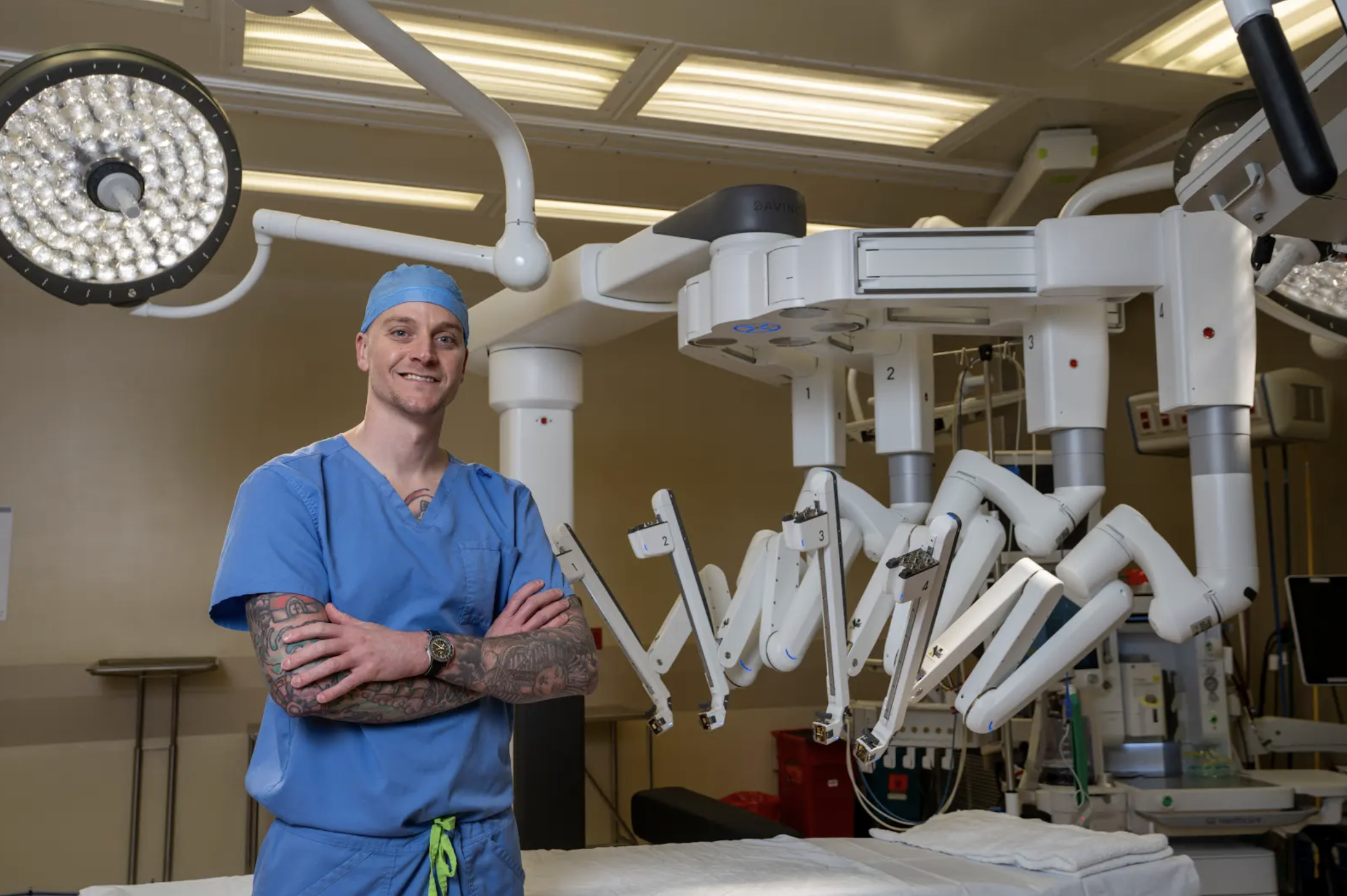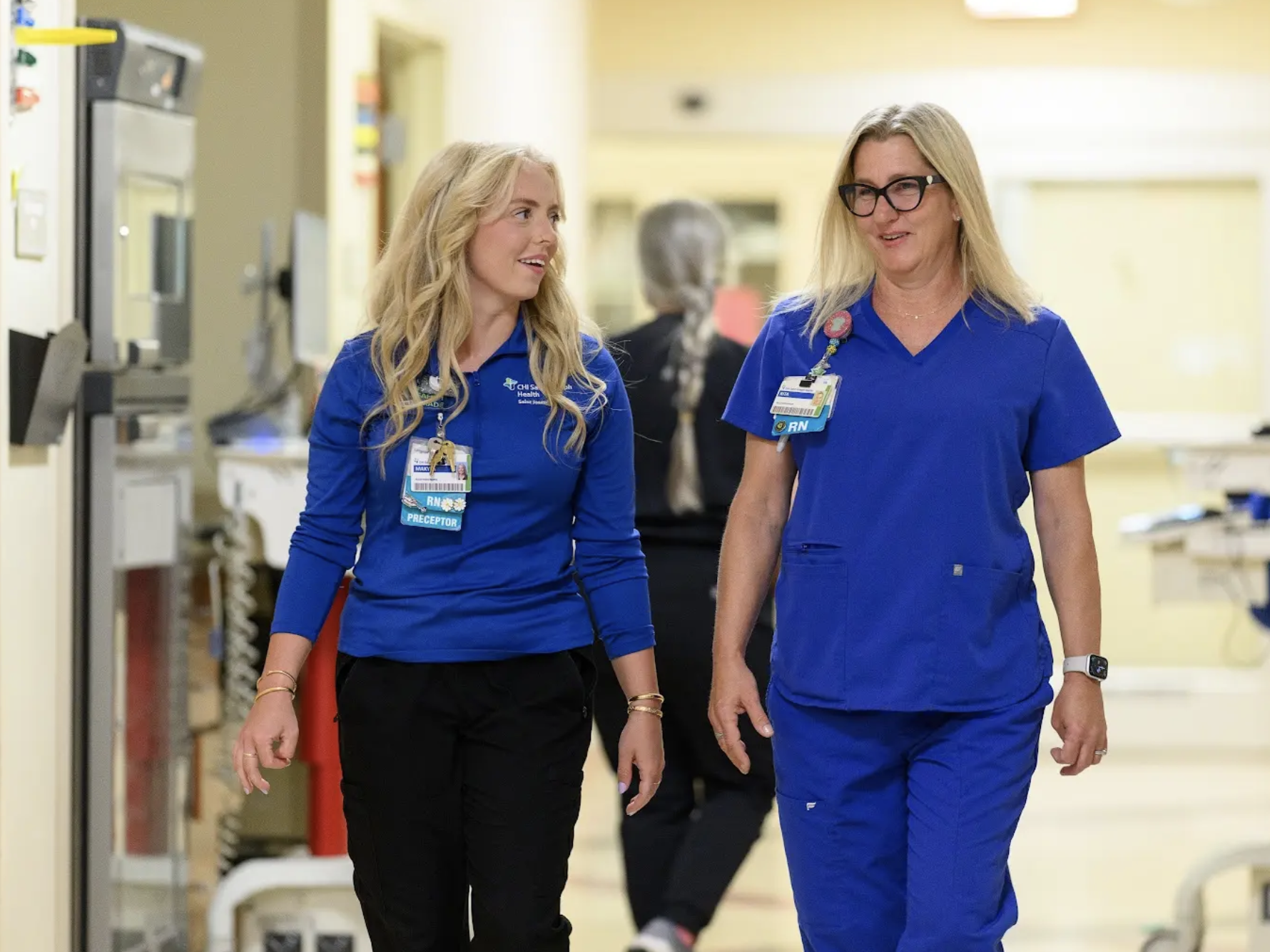Late on Friday, May 16, an EF-4 tornado with winds that reached 170 miles per hour devastated parts of Laurel County. Injured patients streamed into the emergency room (ER) at Saint Joseph London, where medical providers treated them through the night and the next morning.
11–11:45 p.m.
It was an uncharacteristically slow night in the ER.
“We had around eight to 10 patients,” said Makyla Barger, RN, the charge nurse overseeing the ER nursing team that night. “That’s not normal for us. Usually, we have double or triple that number.”
Around 11:30 p.m., the ER team received a call from emergency medical services (EMS) warning them to prepare for a tornado.
11:45 p.m.–12:30 a.m.
Around 11:45 p.m., patients started arriving at the hospital just minutes after the tornado touched down in the community.
In the ER, a nurse began the process of triage — rapidly assessing each patient’s condition to determine who needed care first.
“Quickly, she got overwhelmed,” Barger said. “All of a sudden, we went from zero patients in the lobby to 20 who needed to be triaged. We started a second triage process with another nurse and continued from there.”
General surgeon Nicholas Capal, DO, who had finished a full Friday of surgeries and clinical consultations, returned to the hospital around midnight and leapt into action.
“I immediately had to attend to a very critical patient,” Dr. Capal said. “He was in shock, almost every rib was broken and he had a collapsed lung. We put in chest tubes due to the impact on his lungs.”
Once he’d stabilized one patient, Dr. Capal moved to the next one, and then the next. More than 80 patients received treatment in the initial wave of arrivals.
 Dr. Nicholas Capal
Dr. Nicholas Capal
General surgeon Nicholas Capal, DO, returned to Saint Joseph London around midnight to care for patients injured in the tornado.
Photo by Mark Mahan
12:30–7 a.m.
The nurses and physicians continued caring for patients into the early hours of the morning. Over time, more medical providers arrived to help. Several patients had to be transferred to Lexington for more complex care.
Dr. Capal lost track of the number of patients he saw. Many had broken bones. Some, including a teenager, had intra-abdominal traumatic injuries.
“I put in at least three or four emergency chest tubes and placed multiple tourniquets on injured arms or legs,” Dr. Capal said. “In between, I was quickly trying to assess the patients still in stretchers in the hallway or being wheeled into the department to rule out any devastating injuries.”
Barger marveled at the cohesiveness of the ER team.
“No one came to me and said, ‘What do you think about this?’ or ‘Can you help me?’” she said. “They just handled patient care. All I had to focus on was who would go where and how we would get every patient seen by a provider. All of us trusted each other.”
Around 1:30 or 2 a.m., Barger received word that her house had been destroyed. For hours, she focused on directing her team while burdened with the thought that she didn’t have a home to which she could return. At 7 a.m., however, she learned her home had actually sustained only minor roof damage, although the effects on her farm were more extensive.
7 a.m. to Noon
By daybreak on Saturday, the ER was calmer, after having treated more than 100 patients due to the tornado. Barger finally left the hospital around 8 or 8:30 a.m. The simple acts of compassion she witnessed during that unforgettable shift stayed with her.
“Caregivers would pass patients sitting in the hallway and say, ‘Oh, you’re cold. Let me get you a blanket,’” she said. “Others stopped to talk with patients and tell them they were sorry for what they’d been through.”
Dr. Capal, whose home was undamaged, ended his shift around noon. He was gratified by the support from not just from fellow Saint Joseph Health caregivers, but also from community members who delivered food and drinks.
“I was inspired by how everyone came together to help their neighbors any way they could,”
Taking Humankindness House to House
Normally, Rita Taylor, RN, community outreach nurse at Saint Joseph London, spends her workdays giving CPR lessons and sharing health information at local schools and businesses. The days and weeks after an EF-4 tornado struck London were anything but normal.
After the storm, Taylor was determined to help. She started two days later by delivering one of life’s simple pleasures.
“Many people affected by the storm said, ‘We have plenty of water, but what I wouldn’t give for a hot cup of coffee,’” Taylor said. “So, me, my friend and our teenage daughters bought five gallons of coffee and every type of sweetener and creamer we could find. I didn’t want to just take people hot coffee. I wanted them to be able to prepare it like they would in their own kitchen.”
The group walked door to door through damaged neighborhoods distributing hot drinks and compassion in equal measure. When the coffee ran out, they helped pick up debris.
Over the following days, Taylor and volunteers from other Saint Joseph Health locations delivered more coffee, assisted with the cleanup effort and distributed donations.
“I’m so proud of how we came together, not just those of us from Saint Joseph London, but also caregivers from across our health system,” Taylor said. “The only questions volunteers asked were, ‘Where do we need to go and what do we need to do?’”
